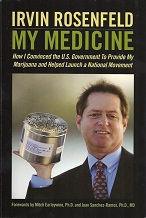Veterans Explore Benefits Of Using Medical Cannabis For Dealing With PTSD
As soldiers, we’re taught that we have the support and the love of the American people. We see the yellow ribbons and we’re told thank you for your service, and the whole 9. That’s not expected to stop as soon as we got out, said Army Veteran Professional Leo Bridgewater, Sr.Bridgewater served several trips in Iraq and Afghanistan. He suffered a knee injury at an Army base back in the states. He is among around 6,500 card-carrying New Jerseyans allowed to utilize medical marijuana.It absolutely helps me with my chronic pain in my knees, but it likewise assists me because I deal with PTSD, he said.Bridgewater considers himself lucky. Other veterans coping with post terrible tension don’t have that option PTSD is not a qualifying condition under the state’s medical cannabis law.With medical cannabis, it’s not how high can I get? It’s what high am I searching for to address whatever issue it may be, Bridgewater said.The plant and its extracts, likewise understoodcalled medical cannabis, are lawfully used by people dealing with cancer, seizures, numerous sclerosis, HIV/AIDS and other persistent illnesses. It’s utilized amongst terminally ill patients.There’s 100,000 individuals in pain, where their discomfort does not qualify due to the fact that it’s not from a legislated, approved list of signs.
So there’s lots of things that have actuallyneed to be added, and we have a chain of command that we’re trying to peck them off on, said Jim Miller, co-founder of Coalition for Medical Cannabis New Jersey.Top of the list: PTSD. The United States Department of Veterans Affairs approximates in between 11 and 20 percent of veterans who served in Operations Iraqi Flexibility and Enduring Liberty are suffering from the condition. New Jersey’s convened a panel of eight medical practitioners to study whether the drug can be utilized to alleviate it. Dr. Alex Bekker is the chair of that panel.Cannabis is not a brand-new drug. It was understood for 5,000 years and people use it recreationally, individuals use alcohol recreationally. To me, it’s not an issue whether you use it or not. The more crucial concern, to this panel,
to me personally, is if it assists with the condition the physician wish to treat, Dr. Bekker said.Miller has actually seen what it can do.I was married to the late, fantastic Cheryl Miller who had multiple sclerosis. By the time she might only move her head, we attempted everything, but she never ever used marijuana socially, so she didn’t know how excellent it might be for her spasticity. I made it for her in a salad.
When I discovereddiscovered exactly what it might do that nothing else could, I would have done anything for her, so I did, and together we set out on a strategy that lasted the rest of her life, Miller said.He said a post in a medical journal provided him the idea.I told her that we can care for this being peaceful, and Ill look after you. Or we can tell the world and she stated to me, do not you wish you ‘d known quicker? What she indicated was she was doing pretty excellent when we met and she may have still been doing quite excellentrespectable, however I
didnt understand. So she asked me that and I stated yeah and then she stated we shouldn’t want somebody to have actually done something for us that we’re not prepared to do for somebody else. So I’m still here, due to the fact that someplace there’s another Cheryl, and we desirewish to ensure they understand, too, he said.Miller does a podcast from the State Home steps. He and Bridgewater spoke at the panel’s first meeting.Not including PTSD In the program it says to me that you ‘d rather have me zombied out on Oxycodone and Percocet which is, when you take a look at it on a regional level here in Trenton, is a huge issue, Miller said.Most people understand, some people call opioids an epidemic in this nation, so it would be extremely advantageous to the public to find an option. It seems to me it can be a sensible alternative in some scenarios, said Dr. Bekker.The panel is taken part in a 60-day public remark duration. At that point members will examine the statements and available evidence, they’ll submit a recommendation to leadership in the Department of Health, then on to the guv’s desk.Follow @ErinDelmoreNJTV
Gippsland grandmother avoids conviction for growing cannabis for medicinal purposes
A Gippsland grandmother has been sentenced to a community corrections order for growing dozens of cannabis plants for medical purposes at her property near Sale.
Heather Gladman, 58, was charged with cultivating a drug of dependence but argued she had only supplied cannabis for free to terminally ill people, including a nine-year-old boy with an inoperable brain tumour.
She avoided a conviction at the Sale Magistrates' Court but will have to perform 60 hours of community service.
Police raided Gladman's Stradbroke property in February where they found 46 cannabis plants.
The case sparked an online petition in support of Gladman calling for an amnesty for users and suppliers of medicinal cannabis.
Gladman also went on a hunger strike for 18 days as a protest against her charges.
Outside court, Gladman said the State Government's move to give the drug to children with epilepsy did not go far enough.
"I'm just going to continue to write to the Government and try and convince the Government to legalise cannabis for people who are dying now, not in 2017. It's too late," she said.
There is NO scientific way to test if drivers are high, landmark study claims
There is no scientific basis for tests to measure if a driver is under the influence of marijuana, a landmark study claims.
Unlike the simple breathalyzer test for alcohol, time-consuming hospital blood tests are used as the gold standard in six states to test for marijuana.
But in fact the results of the complex, time-consuming, and expensive tests often mean nothing, according to a study released on Tuesday by the AAA's safety foundation.
Cannabis stays in the system for up to a month, meaning it is impossible to know if a driver smoked hours ago or weeks ago. And some users could be far more affected by a small amount than others.
Most of the time the officer has no choice but to let people continue on their way - possibly driving under the influence - instead of getting a warrant to take them to hospital.
It would be more safe, the AAA claims, to scrap those laws and let specially-trained police officers make their own judgement based on indicators such as pupil dilation, tongue color and behavior.
Drivers with a blood-alcohol level above 0.08 are deemed legally impaired.
In many states that have legalized cannabis drivers are deemed over the limit if they have 5 nanograms of THC per milliliter of blood.
But marijuana and alcohol are metabolized different, the AAA warns.
It means a driver with low blood-levels of THC - the chemical that makes users high - could still be a serious risk behind the wheel if they aren't a regular user.
Meanwhile a regular could be fine with copious levels of THC in their system.
Yet the laws in five of the six states automatically presume a driver guilty if that person tests higher than the limit, and not guilty if it's lower.
As a result, drivers who are unsafe may be going free while others may be wrongly convicted, the foundation said.
reference: http://www.dailymail.co.uk/news/article-3582408/Scientific-basis-laws-marijuana-driving-questioned.html
Medicinal cannabis to be treatment option in Queensland 'within weeks'
By Gail Burke
Some Queensland doctors could be prescribing medicinal cannabis to patients from as early as next month, the State Government says.
Health Minister Cameron Dick introduced legislation to Parliament to create a legal framework to control the use of cannabis for medical purposes, but the laws will not be debated until later in the year.
The federal Therapeutic Goods Administration (TGA) is expected to make a decision on whether to reschedule cannabis as a medicine by the end of this month, and make it legal to dispense from June 1.
Cameron Dick said he would change state regulations to ensure some Queensland specialists could prescribe cannabis as soon as it is approved by the TGA.
"This will allow Queensland patients to take immediate advantage of the final rescheduling decision without having to wait for the passage of the bill," Mr Dick said.
"Once the bill commences, the regulation amendments will be repealed."
Last week, the State Government granted a Queensland family Australia's first legal medically supervised cannabis treatment.
However, Premier Annastacia Palaszczuk warned this was not a first step toward broader decriminalisation of the drug.
"This is in no way a green light for the recreational use of cannabis nor for people to grow their own cannabis, even if for therapeutic use," she said.
"However, the lawful production of medicinal cannabis does present an opportunity for Queensland businesses to supply goods to this expanding market."
Latest
Coronavirus Strikes Massachusetts Cannabis Company Employees
Reassessing the Essential: Cannabis in the Time of a Pandemic
5 Reasons To Try Aspen Valley CBG Flower (30% Off)
High Times Cannabis Cups Go Virtual In Wake Of Coronavirus Pandemic
Drug Enforcement Administration Proposes Plan To Expand Cannabis Research
Ghana Legalizes Cannabis For Medicinal And Industrial Uses
The cheapest legal weed in Canada: Discover these cannabis ‘value brands’
Cannabis and coronavirus: Here’s what you need to know
cannabis designs
The Best Of
WHO Rules CBD Should Not Be a Scheduled Drug

Dr Cristina Sanchez PhD video interview on medical marijuana and cancer

Biochemist Dennis Hill interview; Cannabis oil as a cure for cancer.

The unofficial World Record holder for cannabis smoking part 1







